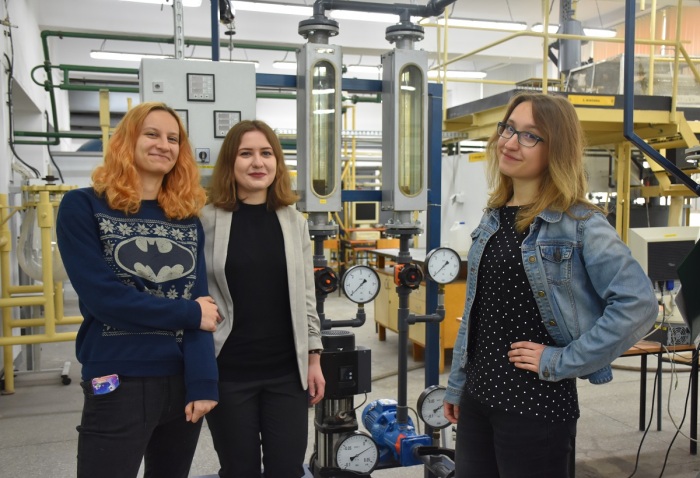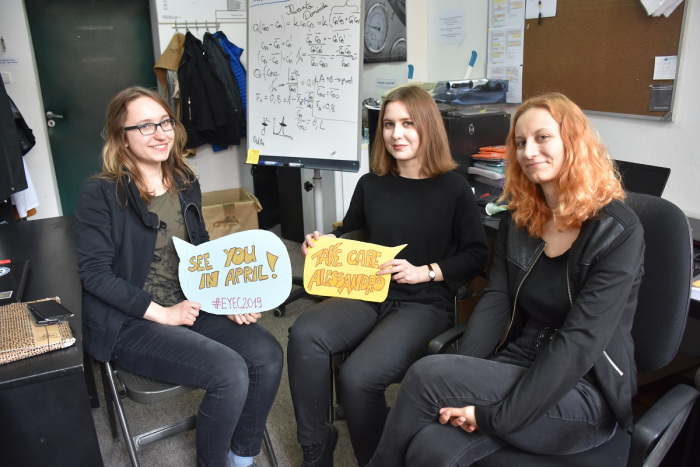No piece of wisdom goes to waste at the Chemical and Process Engineering Student Research Group (KN IChiP). The accumulated knowledge and experience pass from generation to generation of members. Perhaps, this is the key to the growing popularity of their annual multidisciplinary European Young Engineers Conference. We sat to talk about this event with Olga (Coordinator of the 8th EYEC), Justyna (Social Media Coordinator and Board Member of KN IChiP) and Hania (Logistics Coordinator).
What are your impressions of this year’s European Young Engineers Conference?
O.: We are slowly recovering, catching on sleep, mostly. Although, actually, we have already got down to work on the next installment.
Are you looking for successors?
O.: It happens every year that those who helped out preparing one installment climb up the ladder for the next one.
J.: We want to make sure that all those who manage the conference know it inside out. We ask coordinators to be on watch for strengths in people and to assign more responsibility to high flyers so that they get ready for succession on the next event.
H.: We thus try to avoid a scenario where a ‘newbie’ with no knowledge of, say, budgeting, takes control.
Do senior students pass on any guidance to you?
O.: Yes, they certainly do! And this is a good opportunity to say a big thank you to the last year’s coordinator, who saved us from reinventing the wheel this year. Nina prepared an ultimately detailed documentation, including pictures of the conference room and guest refreshment setup. Little as it may seem, that meant one less thing we had to think about in planning.
How many coordinators are involved in the EYEC preparation?
O.: It takes nine coordinators but if you include those who casually give a hand, the number will swell into quite a crowd. Traditionally, we call up all people in our Research Group and some of the Students’ Union Faculty Council members around two weeks in advance of the conference.
Are all of them willing to help out?
O.: Well, it depends. Some can easily get inspired and an impulse is enough. Others need some more persuasion. Our monograph cites all those who have worked with us, primarily, in the run-up to the conference; it is about 30 people, including doctoral students, who help us greatly in preparing the post-conference monograph. They proofread the abstracts and send them to reviewers. A doctoral student herself, the last year’s coordinator is actually one of them.
What has been your biggest challenge this year?
(All in one voice:) The Sunday before the conference!
J.: Typically, the final preparations are done on the Saturday immediately preceding the event and Sunday is just the time for some last touch-ups.
O.: So, it is Sunday, our mates have gone to the airport to pick our special guest who is supposed to give the opening lecture of the overall event. Suddenly, we have a phone call. “Look, the plane arrived an hour ago and we are waiting but the professor is nowhere to be seen.” We try to get in touch with our special guest; but he will not pick up. Thoughts run through the head. What if he has missed his flight? Or, maybe, he is already on the next one? What if he has got lost at the airport?
H.: And then we get a message. Sudden personal business has kept our guest in his home country. On the one hand, we knew he was going through a hard time, but on the other, we were horrified. Thankfully, we immediately came up with a Plan B and another speaker agreed to cover and give the opening lecture.
O.: The special guest of the 6th conference was a doctor from Italy who was on the committee the year before. We wanted him to resume his role in the current year, by way of exception. A week before the date we planned to formally ask him to attend, a storm had destroyed the seaside laboratory he managed so neither he, nor his students could come.
Sounds like you have had adrenaline rushes enough!
O.: At one point, it kicked up one notch too high, but now, it seems, we are more resilient to such twists of events.
When you make preparations for an important event, such as this one, the number of issues that may come out of nowhere must be quite huge…
H.: You come to face those small challenges at every step you take. One of my tasks was to arrange for a pool of prizes and giveaways for the attendees so I stressed out if everything would arrive in time or if those small misunderstandings would get sorted out or if favorable financial terms would be negotiated with the partners. But if you work on a collaborative team, there are always people you can ask for help.
O.: Initially, you feel like being lost in the woods, but once you are through with some things like that, you get more efficient in solving problems and now there is virtually nothing we cannot do.
Do the hosts have the same to-do list every year?
J.: We constantly make improvements. A panel discussion was added for the first time in the 8th instalment. And we have received an encouraging feedback from the attendees. The discussion addressed the European regulations to ban the production of disposable plastics, which are expected to come out in 2021. The participants included a representative of the medical industry and our Guest of Honor, Mr Jörg Vienken, the President of the Polish Chamber of Chemical Industry (PIPC), Mr Tomasz Zieliński, the President of Dow Polska, Mr Giuseppe Santoro, and also our Research Group’s alumnus, Jakub Syczewski, representing Bogucki Folie, a foil manufacturing company.
O.: This year, we have managed to arrange tours of the apparatus laboratories, the filtration laboratories and the graphene laboratory and to hold demonstrations of a confocal microscope and a beer brewing system. The graphene and the confocal microscope events attracted so much interest that tickets were sold out immediately.
EYEC seems to be quite a huge undertaking. Can you rely on the Faculty authorities for help?
O.: They are all positive about this initiative and, basically, each one of the deans has helped us with some or the other. Prof. Eugeniusz Molga, the Faculty Dean, officially authorized the conference and acted as our bridge between the Faculty and the Vice-Rector for Research. And it was actually Rector Bacewicz who opened our conference.
J.: Besides, if we have an important assignment to submit as the conference approaches, we have the permission to deliver it at a later date. The course teachers take a flexible approach on us and they appreciate our effort.
The number of EYEC attendees is growing year on year. Do you get any feedback from them?
J.: Normally, a questionnaire is sent out after the conference asking the attendees, for instance, how they have learnt about the conference. More than a half get the information from their friends or colleagues, which is a very positive sign. This shows that people like the conference and are willing to recommend it to others or return themselves. Actually, the same applies for committee members and special guests. We have some ‘loyal fans’, including, e.g., Dr. Zoltan Kovács.
H.: … regardless of the fact that a special thank you plate for Dr Kovács was accidentally put into a giveaway bag of another guest.
O.: Luckily, such bloopers rarely happen, and if they do, they are more of funny situations that add to a more relaxed atmosphere.
Are you working on some other project while preparing to the 9th EYEC?
Our Student Research Group is now focused on two projects. Algenos is about cultivation of algae and biofuels. We explore how different conditions, including carbon dioxide partial pressure, in two chambers affect the growth and development of algae. This research is made possible with the funding we have received from the Small Pool for Scientific Projects, among others; the Algenos upgrade has been quite a costly feat. The other project is known simply as the ‘Brewery’ among the KN IChiP members. This is a mobile beer production system which uses the waste generated by pressing apple juice. We will be checking things such as the impact of the fermentation temperature on the finished product.
Important! If you have read this text carefully, you have probably captured the information that preparatory work for EYEC continues virtually throughout the year. If you want to join the team coordinating the event, do not hesitate to write to one of the addresses below:
eyec.ichip@pw.edu.pl
knichip.pw@gmail.com
bartha.jan@gmail.com (Coordinator of the next year’s conference)


